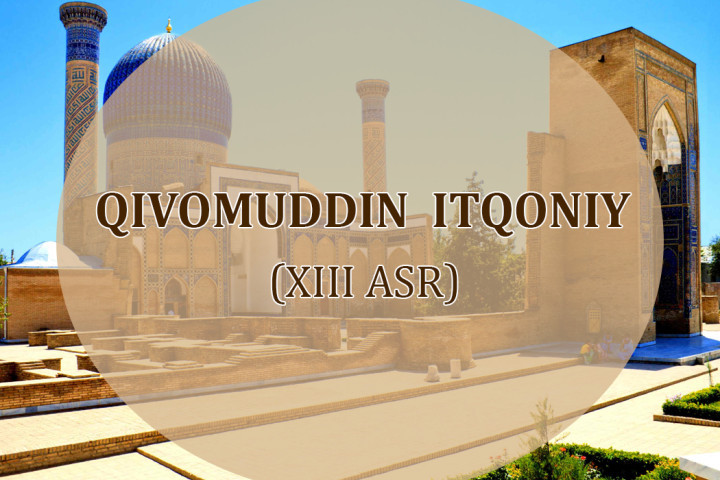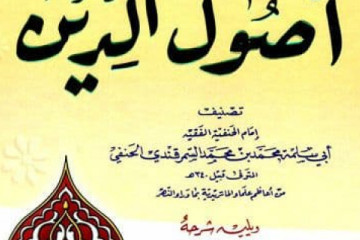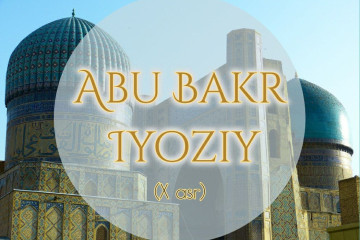
QIWAMUDDIN ITQANI
The scholar’s full name is Qiwamuddin Amir Katib ibn Amir Umar ibn Amir Ghazi Farabi Itqani. He was born in 1286 in the village of Itqan, which belongs to the city of Farab on the banks of the Sayhun river. He is known by the nisbas of Itqani, Farabi, Turkistani, and Otrari. His nickname was Qiwamuddin. Some sources mention that his name is Lutfullah. It is also mentioned that he was highly knowledgeable in Hanafi jurisprudence and received the nickname “Abu Hanifa” due to his fanatical attachment to this sect. The word “Amir” in the name of his ancestors, like his own, indicates that he belonged to the family of a statesman. He first studied in Itqan and learned science from Ahmad ibn As’ad Harifani, one of the scholars of his time. He also attended Abul Barakat Nasafi’s classes in Nishapur.
Itqani, who was one of the leading scholars of his time in Hanafi jurisprudence and the Arabic language, went to Damascus in 720/1320, in the same year for the Hajj. On his way back, he traveled to Cairo and Baghdad. He worked as a judge in Baghdad and as a teacher at the “Mashhad Abu Hanifa” madrasah. In 747/1346, he went to Damascus for the second time and worked as a teacher in “Dar al-Hadis az-Zahiriyya” and “Ganjiyya” madrasas. Here, during one of the evening prayers, he got nervous when the imam, perhaps because he belonged to the Shafi'i sect, raised his hands while returning from ruku’, so he returned his prayer and had an argument with the imam. Taqiyuddin Subki, a Shafi’i jurist, opposed Itqani. He also wrote a treatise on this topic and wrote a refutation of his work. It is said that after these events, Itqani 's authority was damaged and he was removed from his duties. In the sources, his departure to Cairo in 757/1356 is also connected with these events.
Sargatmish Nasiri, one of the famous Mamluk generals in Egypt, personally welcomed Itqani in Cairo. Sources show that he appointed Itqani as the headmaster of the Sargatmishiya madrasah where he taught only Hanafi fiqh and also ordered him to write a commentary on the book “al-Hidaya”. Among the students of Itqani, the most famous is Abul Walid ibn Shihna, who was appointed as qadi in Aleppo and Damascus several times. Itqani was also a calligrapher at the same time as he received the title of “Katib” (Secretary). One of the books he copied is “Taqwim al-Adilla” written by Abu Zayd Dabusi, which is kept in Sulaymaniyah Library (Laleli, No.690, page 261a).
Itqani died in Cairo in 1357 at the age of 73. A large congregation gathered for his funeral and the scholar was buried near Qubbat an-Nasr district outside Cairo.
The scientific legacy of the scholar
Itqani wrote two works on aqeedah. These are “ar-Risala al-Ala’iyya” and “ar-Risala Shaddahat al-Mu’tazila”. Manuscripts of both works are kept in the library of Leiden University in the Netherlands (No.OR 706, pp.21b-29a; No.706, pp.34b-38a).
Some other works of the scholar are also known to us. 1. The work entitled “At-Tabyin” is a commentary on “al-Muntahab fi Usul al-madhab” by Ahsikasi. There are several copies of this work written in 716/1316 (Sulaymaniya Library, Jarullah Afandi, No.508-509; Laleli, No.745; Fatih, No.1311; Topkapi Palace Museum Library, Ahmad Terzhan, No.342). It was published by Sabir Nasir Mustafa Usman as part of his doctoral thesis at Azhar University (1980).
2. “Ghayat al-Bayan wa Nadirat al-Aqran” (Sulaymaniya Library, Damad Ibrahim Pasha, No.625-626; Asad Efandi, No.827-832; Ismikhan Sultan, No.154-159; Yenicami, No.490-502). It is the commentary on one of the most reliable sources of Hanafi jurisprudence, “al-Hidaya”. According to the preface, the author started the commentary during his visit to Cairo in 721/1321, continued the work while in Baghdad and Arran, and finally finished the work in 747/1346 during his second visit to Damascus.
3. “Risala fi Tarki Raf’ al-Yadayn” (Sulaymaniya Library, Fatih, No.2269/3; Laleli, No.3706/15; Lala Ismail, No.98/9). In this treatise, the debate about raising hands before and after bowing in prayer is written.
4. “Qasidat ash-Shafa ma'a sharhihi” (Sulaymaniya Library., Damad Ibrahim Pasha, No.1151/3; Haji Mahmud Afandi, No.3930/1). Both the text and commentary of this work are written on Arabic grammar.
5. “ash-Shamil fi Sharh Usul al-Bazdawi”. It is one of the largest commentaries of the work “Kanz al-Wusul” by Bazdawi. Some sources state that the work was unfinished. However, it can be concluded from one copy of the work, which may be an autographed copy, that the work was completed on October 6, 1352, in Cairo. (Library of Sulaymaniya, Jarullah Afandi, No.487, pp.1a; Jarullah Afandi, No.485, 488, 489, 500)
6. “Wardat al-Arwah fi al-Asma al-Marwiyya fi al-Muannasat as-Sama'iyya” (Sulaymaniya Library., Lala Ismail, No.706/23).
7. “al-Lubab fi al-Ilm al-Hisab” (Sulaymaniya Library., Yenicami, No.301/6).
8. “Durar” or “Manzumat ad-Durar” (Sulaymaniya Library, Laleli, No.1328/1, autograph). It is a poetical version of “al-Faraid al-Sirajiyya” by Sirajuddin Muhammad ibn Muhammad Sajawandi. This work was presented to Amir Sargatmish forty years after it was penned in Bukhara in 710/1310.
Itqani made a great contribution to the development of the Hanafi madhab with his invaluable works. In his time, he was one of the people who stood up for the protection of this sect. Kamalpashazada (d. 940/1534) listed Itqani among more than 50 Hanafi scholars who received the title of “mujtahid" in his work “ar-Risala fi Tabaqat al-Mujtahidin”.
Additional Information



 O`Z
O`Z
 РУ
РУ
 EN
EN
 العربية
العربية

Notes